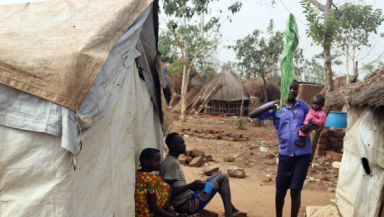
All summer, heavy spring rains around Lake Victoria have slowly worked their way through the Nile River's swampy course through Uganda, eventually flooding Kuon Nyawal's farm in South Sudan, destroying her crops, killing her livestock and leaving her home in ruins.
"The floods have left us unable to grow our own food, and the little we manage to acquire is simply not enough. This has led to a desperate shortage of food and irregular meals for our family," said the 35-year-old mother of four who has taken refuge at the Bentiu Internally Displaced Persons camp, 435 miles north of Juba, the country's capital.
Nyawal is among 750,000 South Sudanese threatened by the floods and at risk of starvation among a population of more than 12.7 million people, of whom about 61% identify as Christian.
"We are very worried about the situation because floods have destroyed the region's farming and caused mass displacement, and people may never return to their homes," Nyawal said. "Something needs to happen to save people from these effects of climate change."
The dire situation in Bentiu and nearby regions has spurred religious leaders to join nongovernmental organizations in coming to South Sudanese communities' aid, particularly farming areas.
"It is clear that urgent and comprehensive measures are needed to address these pressing challenges," said James Deng, a local evangelist, or pastor. He noted that more than 300,000 people were living in refugee camps in the Bentiu region. "People are not living in their homes, their crops are destroyed, and there's looming starvation. We are working hard to try to find a better solution to this kind of climate change."
Deng said the dikes built by United Nations Mission in South Sudan are inadequate and pointed out that local churches "are actively involved in constructing dikes to safeguard thousands of lives at risk of flooding. By supporting the building of even one dike, individuals can have a significant impact in saving many lives."
Deng also hoped that churches would increase their donations of food and essential supplies. "We can provide vital aid and alleviate the threat of starvation for those affected."
Bishop Christian Carlassare of the Catholic Diocese of Bentiu also noted that the church was collaborating with NGOs to build dikes, dams and other water management infrastructure. These structures are sustainable, he said, retaining water for use during droughts.
"Our goal is to minimize the devastation caused by floods on both crops and households in order to prevent future suffering due to climate change," the bishop said. He said the diocese is training people in dike construction, hoping to empower them to protect their land from future floods. "It's crucial to prepare our communities proactively to safeguard their land and crops against disasters."
Despite a 2018 peace deal between government and opposition forces, the country continues to grapple with the lingering effects of the 2013-18 civil war, as numerous armed groups persist in fighting.
The Italian-born Carlassare, who narrowly survived an attack by gunmen at his Rumbek residence in April 2021, implored the people of South Sudan to unite in peace and stand together in the face of climate change.
"Families residing in flood-prone areas have endured relentless challenges, including years of conflict, food insecurity, recurring floods and an influx of refugees and returnees from Sudanese conflict," he said. "To propel the nation forward, the people of South Sudan must join forces to foster unity and peace. The collective prayers and unwavering faith of the population can alleviate the suffering caused by flooding and conflict."
Evangelist Mayol Kuot said his church has been actively providing essential supplies such as shovels, plastic sheets, sandbags and digging bars to fortify the dikes around the villages, particularly in northeastern South Sudan, to ensure the safety of the local population.
At the same time, church leaders are calling on the government, more faith-based organizations and other well-wishers to join them in assisting the vulnerable communities. They emphasize that the situation remains critical.
"It is imperative that immediate action is taken to preserve the lives of the people," said Kuot, who serves in Malakal, a town in northeastern South Sudan. "The dikes in flood-prone areas must be reinforced and expanded with the creation of water storage dams. The displaced individuals urgently need sufficient food, medical supplies, and other necessities, while also requiring relocation to higher ground."
© Religion News Service













